Related Research Articles

Aerosmith is an American rock band formed in Boston in 1970. The group consists of Steven Tyler, Joe Perry (guitar), Tom Hamilton (bass), Joey Kramer (drums), and Brad Whitford (guitar). Their style, which is rooted in blues-based hard rock, has also incorporated elements of pop rock, heavy metal, glam metal, and rhythm and blues, and has inspired many subsequent rock artists. Aerosmith is sometimes referred to as "the Bad Boys from Boston" and "America's Greatest Rock and Roll Band". The primary songwriting team of Tyler and Perry is sometimes referred to as the "Toxic Twins.”

Draw the Line is the fifth studio album by American hard rock band Aerosmith, released on December 9, 1977. It was recorded between June–October in an abandoned convent near New York City. The portrait of the band on the album cover was drawn by the celebrity caricaturist Al Hirschfeld.

Henry St. Claire Fredericks Jr., better known by his stage name Taj Mahal, is an American blues musician and actor. He plays the guitar, piano, banjo, harmonica, and many other instruments, often incorporating elements of world music into his work. Mahal has done much to reshape the definition and scope of blues music over the course of his more than 50-year career by fusing it with nontraditional forms, including sounds from the Caribbean, Africa, India, Hawaii, and the South Pacific.
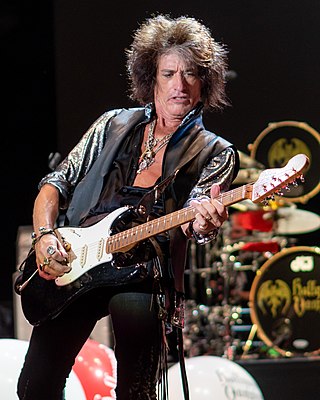
Joseph Anthony Pereira, professionally known as Joe Perry, is an American musician best known as the founding member, lead guitarist, backing and occasional lead vocalist of the rock band Aerosmith. Perry also has his own solo band called the Joe Perry Project, and is a member of the all-star band Hollywood Vampires with Alice Cooper and Johnny Depp.
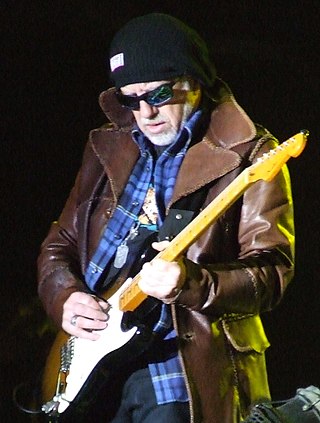
Bradley Ernest Whitford is an American musician who is best known for serving as the rhythm guitarist for the hard rock band Aerosmith for which he was inducted into the Rock and Roll Hall of Fame in 2001. He has also worked as a songwriter for the group, co-composing well-received tracks such as 1976's "Last Child".

"Walk This Way" is a song by the American rock band Aerosmith. Written by Steven Tyler and Joe Perry, the song was originally released as the second single from the album Toys in the Attic (1975). It peaked at number 10 on the Billboard Hot 100 in early 1977, part of a string of successful hit singles for the band in the 1970s. In addition to being one of the songs that helped break Aerosmith into the mainstream in the 1970s, it also helped revitalize their career in the 1980s when it was covered by hip hop group Run-D.M.C. on their 1986 album Raising Hell. This cover was a touchstone for the new musical subgenre of rap rock, or the melding of rock and hip hop. It became an international hit and won both groups a Soul Train Music Award for Best Rap Single in 1987 Soul Train Music Awards. Both versions are in the Grammy Hall of Fame.
Honkin' on Bobo is the fourteenth studio album by American rock band Aerosmith, released on March 30, 2004, by Columbia Records. The album includes 11 covers of blues and blues rock songs from the 1950s and 1960s, with one new song, "The Grind". The album pays tribute to Aerosmith's earliest influences and showcases a rawer sound when compared to their more recent commercial efforts. Honkin' on Bobo was produced by Jack Douglas, who was Aerosmith's producer on a vast majority of their 1970s output.

Aerosmith is the debut studio album by the American rock band Aerosmith, released on January 5, 1973, by Columbia Records. "Dream On", originally released as a single in 1973, became an American top ten hit when re-released on 27 December 1975. The album peaked at number 21 on the US Billboard 200 album chart in 1976.
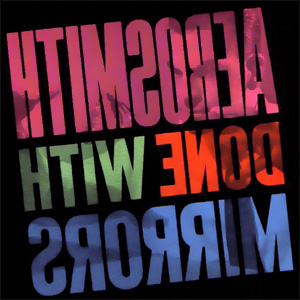
Done with Mirrors is the eighth studio album by American rock band Aerosmith, released on November 4, 1985. It marked the return to the band of guitarists Joe Perry, who left in 1979 and Brad Whitford, who departed in 1981. The band's first album on Geffen Records, it was intended as their ‘comeback’. However, the record failed to live up to commercial expectations despite positive reviews.
Permanent Vacation is the ninth studio album by American rock band Aerosmith, released by Geffen Records on August 25, 1987. The album marks the band's shift to a pop-metal sound that they would maintain up to 2001's Just Push Play.
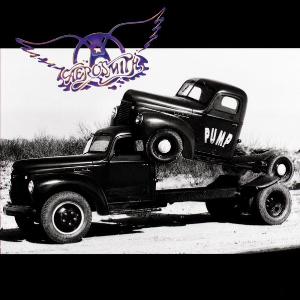
Pump is the tenth studio album by American rock band Aerosmith. It was released on September 12, 1989, by Geffen Records. The album peaked at No. 5 on the US charts, and was certified septuple platinum by the RIAA in 1995.
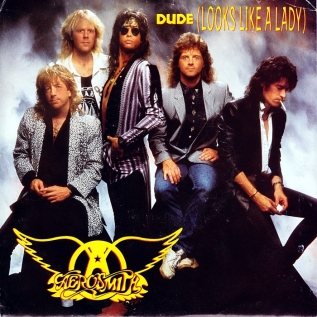
"Dude (Looks Like a Lady)" is a song by American rock band Aerosmith. It was released as the lead single from the band's ninth studio album Permanent Vacation in 1987.

"What It Takes" is a power ballad by American rock band Aerosmith. Written by Steven Tyler, Joe Perry, and Desmond Child, it was released in 1989 as the third single from the critically and commercially successful 1989 album Pump. "I'll put some ballads on an album," Tyler remarked, "if that's what it takes so that some young kid can get to hear a 'Young Lust' or 'F.I.N.E.*'."

"Angel" is a power ballad by American rock band Aerosmith. It was written by lead singer Steven Tyler and professional songwriting collaborator Desmond Child.
"F.I.N.E.*" is a song by rock band Aerosmith. It was written by lead singer Steven Tyler and lead guitarist Joe Perry. The song title is an acronym for "Fucked Up, Insecure, Neurotic, and Emotional", as stated in the album's liner notes. The song, totaling four minutes, nine seconds, is the second track on the band's 1989 album Pump. It was released as a promotional single to rock radio in 1989, and reached No. 14 on the Mainstream Rock Tracks chart.

Taj Mahal is the debut album by American guitarist and vocalist Taj Mahal. Recorded in 1967, it contains blues songs by Sleepy John Estes, Robert Johnson, and Sonny Boy Williamson II reworked in contemporary blues- and folk-rock styles. Also included is Taj Mahal's adaptation of Blind Willie McTell's "Statesboro Blues", which inspired the popular Allman Brothers Band recording.
Tim Collins is a businessman and band manager, most noted for being the American hard rock band Aerosmith’s manager from 1984-1996.

"You See Me Crying" is a power ballad by American hard rock band Aerosmith. It was released in 1975 as the last track on the band's breakthrough album Toys in the Attic. A shorter mix of the song was released as the third single from the album in November 1975, but failed to chart. Consequently, the original single is rather rare.

The Permanent Vacation Tour, by American hard rock band Aerosmith, lasted from October 1987 to September 1988. It supported the band's commercially successful comeback album Permanent Vacation, released in September 1987.

"Get It Up" is a song by American hard rock band Aerosmith. Written by lead singer Steven Tyler and guitarist Joe Perry, the song features Karen Lawrence, singer of the band L.A. Jets, on the chorus. It was released in 1978 as the third and final single from their album Draw the Line. The single also included "Milk Cow Blues" as a B-side. The single failed to break into the singles chart. The guitar is noted for its usage of slide guitar. The single had a reference to the next track on the album, "Bright Light Fright". The song was played occasionally by the band during the Aerosmith Express Tour from 1977 to 1978 in support of the Draw the Line album.
References
- 1 2 3 Bienstock, Richard (2020). Aerosmith, 50th Anniversary Updated Edition: The Ultimate Illustrated History of the Bad Boys from Boston. Voyageur Press. pp. 131, 139. ISBN 9780760369364.
- ↑ Wilkening, Matthew (August 18, 2015). "How Aerosmith Came Roaring Back With 'Permanent Vacation'". Ultimate Classic Rock. Retrieved 2021-04-13.
- ↑ "POP MUSIC : Steven Tyler--Straight but Still Swaggering". Los Angeles Times. 1988-01-24. Retrieved 2021-04-13.
- ↑ Greene, Andy (2019-09-18). "Inside Aerosmith's 'Deuces Are Wild' Las Vegas Set List". Rolling Stone. Retrieved 2021-06-23.
- ↑ Greene, Andy (2016-07-13). "Readers' Poll: The 10 Best Aerosmith Deep Cuts". Rolling Stone. Retrieved 2021-06-23.
- ↑ Perry, Joe; Ritz, David (2015). Rocks: My Life in and Out of Aerosmith. Simon & Schuster. p. 247. ISBN 9781476714592.
- 1 2 3 4 Considine, J.D. (November 13, 1987). "Comeback takes Aerosmith back to its rock roots". Baltimore Sun. p. 14. Retrieved 2022-05-23– via newspapers.com.
- 1 2 3 4 Power, Martin (1997). The Complete Guide to the Music of Aerosmith. Omnibus Press. pp. 87–88. ISBN 0711955980.
- 1 2 Saine, Deborah (October 26, 1987). "Aerosmith proves place in '80s rock with release". p. 5. Retrieved 2022-05-23– via newspapers.com.
- ↑ Franck, John. "Permanent Vacation". Allmusic. Retrieved 2022-05-23.
- ↑ "Aerosmith - Mainstream rock". Billboard. Retrieved 2021-06-22.